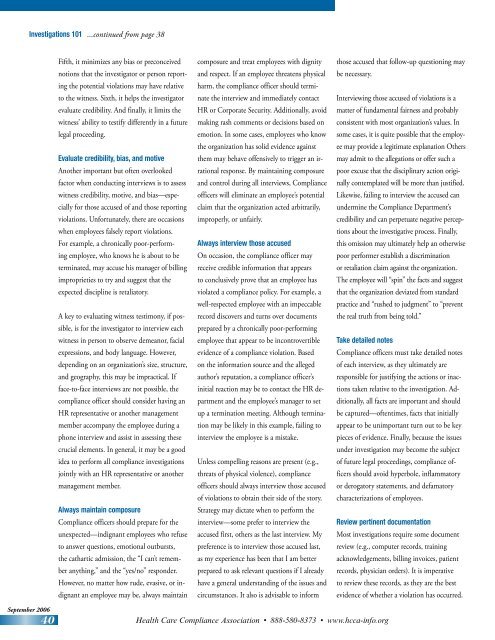JO - Health Care Compliance Association
JO - Health Care Compliance Association
JO - Health Care Compliance Association
Create successful ePaper yourself
Turn your PDF publications into a flip-book with our unique Google optimized e-Paper software.
Investigations 101 ...continued from page 38<br />
Fifth, it minimizes any bias or preconceived<br />
notions that the investigator or person reporting<br />
the potential violations may have relative<br />
to the witness. Sixth, it helps the investigator<br />
evaluate credibility. And finally, it limits the<br />
witness’ ability to testify differently in a future<br />
legal proceeding.<br />
Evaluate credibility, bias, and motive<br />
Another important but often overlooked<br />
factor when conducting interviews is to assess<br />
witness credibility, motive, and bias—especially<br />
for those accused of and those reporting<br />
violations. Unfortunately, there are occasions<br />
when employees falsely report violations.<br />
For example, a chronically poor-performing<br />
employee, who knows he is about to be<br />
terminated, may accuse his manager of billing<br />
improprieties to try and suggest that the<br />
expected discipline is retaliatory.<br />
A key to evaluating witness testimony, if possible,<br />
is for the investigator to interview each<br />
witness in person to observe demeanor, facial<br />
expressions, and body language. However,<br />
depending on an organization’s size, structure,<br />
and geography, this may be impractical. If<br />
face-to-face interviews are not possible, the<br />
compliance officer should consider having an<br />
HR representative or another management<br />
member accompany the employee during a<br />
phone interview and assist in assessing these<br />
crucial elements. In general, it may be a good<br />
idea to perform all compliance investigations<br />
jointly with an HR representative or another<br />
management member.<br />
Always maintain composure<br />
<strong>Compliance</strong> officers should prepare for the<br />
unexpected—indignant employees who refuse<br />
to answer questions, emotional outbursts,<br />
the cathartic admission, the “I can’t remember<br />
anything,” and the “yes/no” responder.<br />
However, no matter how rude, evasive, or indignant<br />
an employee may be, always maintain<br />
composure and treat employees with dignity<br />
and respect. If an employee threatens physical<br />
harm, the compliance officer should terminate<br />
the interview and immediately contact<br />
HR or Corporate Security. Additionally, avoid<br />
making rash comments or decisions based on<br />
emotion. In some cases, employees who know<br />
the organization has solid evidence against<br />
them may behave offensively to trigger an irrational<br />
response. By maintaining composure<br />
and control during all interviews, <strong>Compliance</strong><br />
officers will eliminate an employee’s potential<br />
claim that the organization acted arbitrarily,<br />
improperly, or unfairly.<br />
Always interview those accused<br />
On occasion, the compliance officer may<br />
receive credible information that appears<br />
to conclusively prove that an employee has<br />
violated a compliance policy. For example, a<br />
well-respected employee with an impeccable<br />
record discovers and turns over documents<br />
prepared by a chronically poor-performing<br />
employee that appear to be incontrovertible<br />
evidence of a compliance violation. Based<br />
on the information source and the alleged<br />
author’s reputation, a compliance officer’s<br />
initial reaction may be to contact the HR department<br />
and the employee’s manager to set<br />
up a termination meeting. Although termination<br />
may be likely in this example, failing to<br />
interview the employee is a mistake.<br />
Unless compelling reasons are present (e.g.,<br />
threats of physical violence), compliance<br />
officers should always interview those accused<br />
of violations to obtain their side of the story.<br />
Strategy may dictate when to perform the<br />
interview—some prefer to interview the<br />
accused first, others as the last interview. My<br />
preference is to interview those accused last,<br />
as my experience has been that I am better<br />
prepared to ask relevant questions if I already<br />
have a general understanding of the issues and<br />
circumstances. It also is advisable to inform<br />
those accused that follow-up questioning may<br />
be necessary.<br />
Interviewing those accused of violations is a<br />
matter of fundamental fairness and probably<br />
consistent with most organization’s values. In<br />
some cases, it is quite possible that the employee<br />
may provide a legitimate explanation Others<br />
may admit to the allegations or offer such a<br />
poor excuse that the disciplinary action originally<br />
contemplated will be more than justified.<br />
Likewise, failing to interview the accused can<br />
undermine the <strong>Compliance</strong> Department’s<br />
credibility and can perpetuate negative perceptions<br />
about the investigative process. Finally,<br />
this omission may ultimately help an otherwise<br />
poor performer establish a discrimination<br />
or retaliation claim against the organization.<br />
The employee will “spin” the facts and suggest<br />
that the organization deviated from standard<br />
practice and “rushed to judgment” to “prevent<br />
the real truth from being told.”<br />
Take detailed notes<br />
<strong>Compliance</strong> officers must take detailed notes<br />
of each interview, as they ultimately are<br />
responsible for justifying the actions or inactions<br />
taken relative to the investigation. Additionally,<br />
all facts are important and should<br />
be captured—oftentimes, facts that initially<br />
appear to be unimportant turn out to be key<br />
pieces of evidence. Finally, because the issues<br />
under investigation may become the subject<br />
of future legal proceedings, compliance officers<br />
should avoid hyperbole, inflammatory<br />
or derogatory statements, and defamatory<br />
characterizations of employees.<br />
Review pertinent documentation<br />
Most investigations require some document<br />
review (e.g., computer records, training<br />
acknowledgements, billing invoices, patient<br />
records, physician orders). It is imperative<br />
to review these records, as they are the best<br />
evidence of whether a violation has occurred.<br />
September 2006<br />
40<br />
<strong>Health</strong> <strong>Care</strong> <strong>Compliance</strong> <strong>Association</strong> • 888-580-8373 • www.hcca-info.org

















